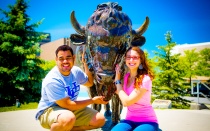Learning Goals and Objectives
The overall goal of the Behavioral Neuroscience Doctoral Program is to provide students with both a broad and deep knowledge of physiological and biological factors that control and affect behavior.
Overview
The Behavioral Neuroscience Program provides training toward the PhD for approximately 20 students at a time. Through a close and personalized student-mentor relationship we try to instill in the student an appreciation for programmatic problem-oriented, rather than technique-oriented, research, and seek to produce sophisticated, versatile teacher/scientists. Faculties in the area represent a wide range of interests in Behavioral Neuroscience, making our program a particularly rich and diverse intellectual environment. Our core faculty conduct innovative research on motivated behavior, pain, auditory processing, and synaptic plasticity. Core faculty expertise is complimented by a number of adjunct faculty members that add intellectual breadth by participating in some program activities and serving on some student committees.
Specific Goals and Objectives for PhD Students in Behavioral Neuroscience
Objective 1: All students will document knowledge of diverse areas of psychology.
Expected Competencies: Competencies are evidenced by successful completion of departmental distribution course requirements in each of the areas of the department, namely, behavioral neuroscience, cognitive psychology, social-personality and clinical.
Objective 1: All students will document knowledge of literature and sub-disciplines with Behavioral Neuroscience.
Expected Competencies: Competencies are evidenced by successful completion of Area coursework, and successful completion of the Behavior Neuroscience comprehensive exam.
Objective 3: All students will document knowledge and technical proficiency of the methods to employ to answer behavioral neuroscience research questions.
Expected Competencies: Competencies are evidenced by successful completion of experiments as part of the student’s program of research, active participation in area brown bag meetings, successful completion of the area comprehensive exam, and successful completion of the dissertation project.
Objective 4: All students will document skills and knowledge necessary to design, execute, and analyze meaningful experiments as part of focused program of research.
Expected Competencies: Competencies are evidenced by successful completion of research projects, satisfactory completion of presentations in area brown bag meetings, successful completion of relevant coursework (e.g., statistics), and successful completion of the dissertation project.
Objective 5: All students will document the necessary skills and knowledge to effectively communicate results of their research in written and oral form.
Expected Competencies: Competencies are evidenced by writing up and publishing results of research in high-level peer-reviewed journals, successful completion of the area comprehensive exam, successful completion of the dissertation project, and presentations of research at national conferences.
Objective 6: All students will document the necessary skills and knowledge to be effective college-level instructors.
Expected Competencies: Competencies will be evidenced by successful completion of the department seminar Teaching College Psychology, and success in independently teaching an undergraduate course or recitation.

